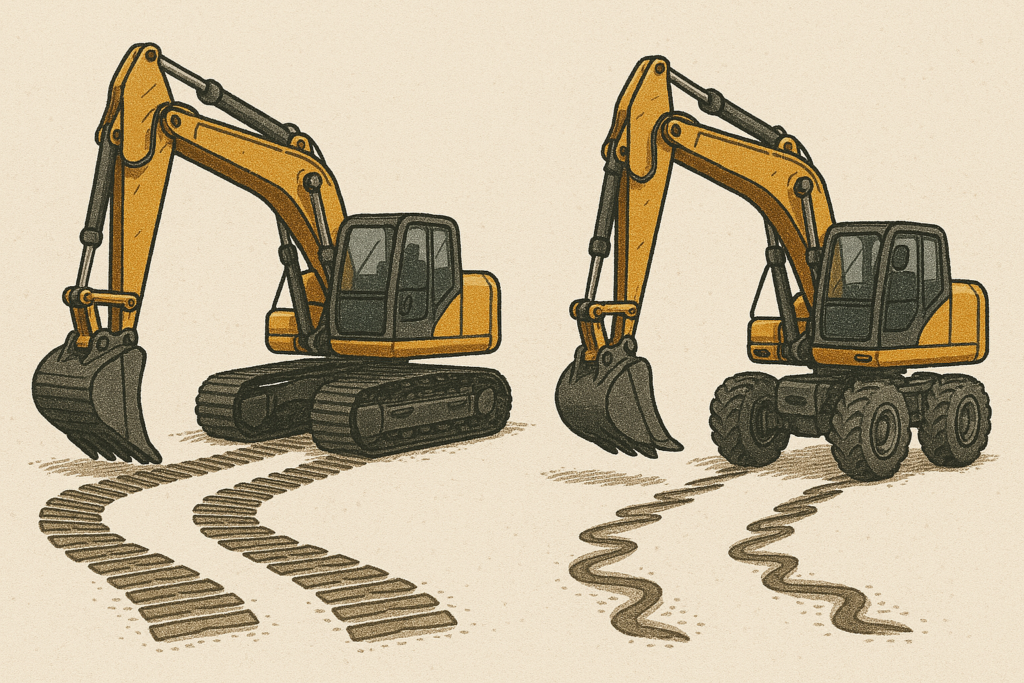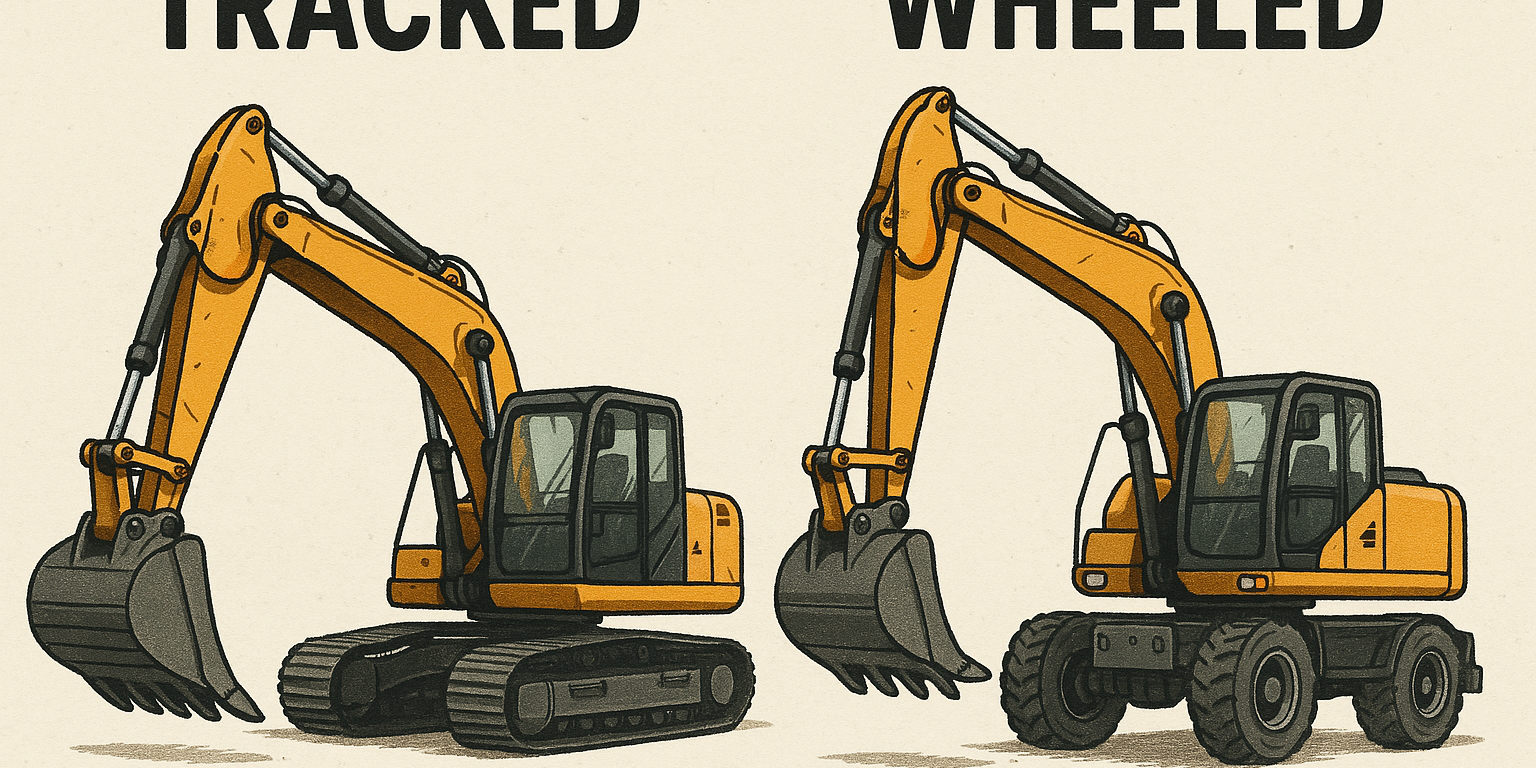Selecting the appropriate excavator type is a critical decision when renting construction machinery. Both tracked and wheeled excavators offer distinct advantages depending on your specific project requirements.
Tracked Excavators
Tracked excavators, also known as crawler excavators, feature continuous metal or rubber tracks instead of wheels. These tracks distribute the machine’s weight across a larger surface area.
Superior Stability in Difficult Conditions
Tracked excavators excel in challenging environments. Their design provides exceptional stability on uneven surfaces. This makes tracked models ideal for rough terrain projects.
The continuous tracks create a larger footprint than wheels. This design reduces ground pressure and prevents sinking in soft soil. Tracked models can navigate muddy, sandy, or rocky terrain with ease.
Powerful Performance for Heavy-Duty Tasks
When it comes to raw power, tracked excavators typically outperform their wheeled counterparts. Their stable base allows for greater digging depth and lifting capacity. This makes tracked excavators perfect for heavy excavation work.
Construction projects requiring significant earth moving benefit from tracked excavators. Their powerful hydraulic systems can handle tough materials efficiently. Demolition work also benefits from their stability and strength.
Key Advantages of Tracked Excavators:
- Exceptional stability on uneven ground
- Superior traction in mud, sand, and loose soil
- Higher digging and lifting capacities
- Better performance on slopes and inclines
- Reduced ground pressure prevents sinking
- Greater power for breaking hard materials
- Excellent maneuverability in tight spaces
Limitations to Consider
Despite their advantages, tracked excavators have some drawbacks. Their tracks move significantly slower than wheels. Transportation between job sites often requires a trailer.
Tracked models can damage finished surfaces like asphalt or concrete. Their operating costs may be higher due to track maintenance. Fuel consumption is typically greater than wheeled models.
Wheeled Excavators
Wheeled excavators, also known as mobile excavators, feature rubber tires instead of tracks. This design offers distinct advantages for certain construction scenarios.
Unmatched Mobility Between Job Sites
The primary advantage of wheeled excavators is mobility. They can travel at speeds up to 40 kph on roads. This eliminates the need for trailers when moving between nearby sites.
Urban construction projects benefit greatly from wheeled models. Their ability to navigate streets without damaging pavement is invaluable. They can quickly relocate without additional transportation equipment.
Gentle on Finished Surfaces
Wheeled excavators cause minimal damage to completed surfaces. Their rubber tires are gentler on asphalt, concrete, and landscaped areas. This makes them ideal for projects in developed areas.
Utility work in residential neighbourhoods often requires wheeled excavators. Road construction and repair also benefit from their surface-friendly design. Their reduced impact minimizes restoration costs after project completion.
Economic Benefits of Wheeled Options
Operating costs for wheeled excavators are typically lower. Tire maintenance is generally less expensive than track maintenance. Fuel efficiency is also better due to reduced rolling resistance.
The versatility of wheeled excavators can reduce equipment rental needs. Many models feature stabilizer legs for added stability when digging. Some even offer blade attachments for light grading work.
Key Advantages of Wheeled Excavators:
- Superior mobility between job sites
- Faster travel speeds (up to 40 kph)
- Minimal damage to finished surfaces
- Lower fuel consumption
- Reduced transportation costs
- Versatility for multiple tasks
- Lower maintenance expenses
- Better operator comfort on long drives
Limitations to Consider
Wheeled excavators have less stability than tracked models. Their lifting capacity is typically lower due to this reduced stability. They struggle in soft ground conditions where they may sink.
Steep slopes present challenges for wheeled excavators. Their traction is limited compared to tracked machines. They also have a higher centre of gravity, affecting performance.

Comparing Performance Factors: Making an Informed Rental Decision
Several key factors should influence your excavator rental choice. Understanding these will help match the right machine to your specific project needs.
Terrain Considerations
The job site terrain is perhaps the most important factor. Soft, uneven ground strongly favours tracked excavators. Paved surfaces and firm ground are better suited for wheeled models.
Construction sites with significant grade changes need tracked excavators. Urban environments with flat, finished surfaces benefit from wheeled options. Mixed terrain might require renting both types for different phases.
Project Duration and Mobility Requirements
Consider how frequently the excavator needs to move. Short-term projects in one location work well with either type. Projects requiring frequent relocation benefit from wheeled excavators.
Long-term construction at a single site often favours tracked excavators. Their stability and power outweigh mobility concerns. Projects spanning multiple locations may justify wheeled excavator rental.
Lifting and Digging Specifications
Evaluate your project’s specific power requirements. Heavier lifting tasks generally require tracked excavators. Their stable base allows for greater capacity.
Deep excavation work benefits from tracked models. Their design provides better leverage for digging. Lighter utility work can often be handled effectively by wheeled models.
Transportation Logistics
Consider how you’ll move the excavator to your site. Tracked excavators almost always require trailer transport. This adds logistical complexity and cost.
Wheeled excavators can often drive directly to nearby sites. This eliminates loading/unloading time and trailer rental. For distant projects, both types require similar transportation arrangements.
Cost Considerations When Renting Excavators
Several factors affect the total cost of excavator rental. Initial rental rates for tracked excavators are often higher. However, the complete cost picture includes several variables.
Fuel consumption tends to be higher with tracked models. Transportation costs may be greater due to trailer requirements. Surface repair expenses after project completion should be considered.
Wheeled ones typically offer lower daily operating costs. Their fuel efficiency and reduced surface damage create savings. However, they may be less efficient for heavy digging tasks.
Specialized Applications: When to Choose Each Excavator Type
Certain construction scenarios clearly favour one excavator type over the other.
Ideal Tracked Excavators Applications:
- Forestry and land clearing projects
- Mining and quarry operations
- New construction on undeveloped land
- Demolition of large structures
- Pipeline installation through varied terrain
- Foundation excavation in soft soil
- Slope and embankment work
- Heavy lifting operations
Ideal Wheeled Excavators Applications:
- Urban utility repairs
- Road construction and maintenance
- Municipal works in developed areas
- Landscaping on finished properties
- Projects requiring frequent relocation
- Work on sensitive ground surfaces
- Light to medium excavation tasks
- Projects with significant on-road travel
Maintenance Considerations for Rental Equipment
Understanding maintenance differences helps predict total rental costs. Tracked excavators require regular track tension adjustments. Track components also wear faster than tires.
Wheeled excavators need tire pressure monitoring. Their wheel bearings require periodic inspection. However, overall maintenance is typically simpler than tracked models.
Conclusion: Making the Optimal Excavators Rental Choice
Both tracked and wheeled excavators have their place in construction. The right choice depends on your specific project requirements. Carefully assess terrain, mobility needs, and lifting requirements.
Renting construction machinery allows flexibility in equipment selection. Many contractors rent different excavator types for various project phases. This approach optimizes performance while controlling costs.
For challenging terrain and heavy-duty excavation, tracked ones excel. For urban work and projects requiring mobility, wheeled ones are superior. Some projects benefit from having both types available.
Contact our construction machinery rental experts today. We’ll help you select the perfect excavator for your specific project needs. Our extensive fleet includes both tracked and wheeled options in various sizes.






